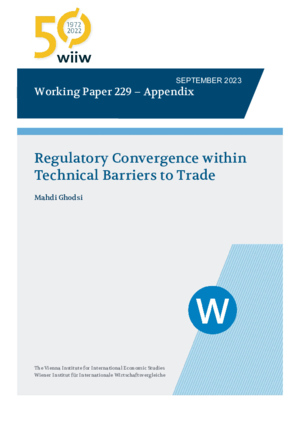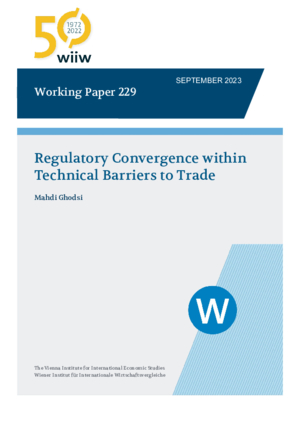Regulatory Convergence within Technical Barriers to Trade
wiiw Working Paper No. 229, September 2023
49 pages including 18 Tables and 7 Figures
This paper analyses how regulatory convergence in different categories of technical barriers to trade (TBTs) imposed on imports of goods in information and communications technology (ICT) globally affected the values, volumes, and unit values of imported goods during the period 1996-2019. Keywords cited in TBTs that are notified to the World Trade Organization (WTO) give an indication of the regulatory objectives behind the imposition of TBTs. MAST also classifies TBTs based on their applicability, procedural and administrative uses, factors which will also be taken into consideration in the analysis. However, objectives of TBTs may provide better insights to policymakers. TBTs are non-discriminatory measures that are imposed unilaterally on all trading partners and on domestic producers. It is not feasible to analyse unilateral TBTs in a gravity setting, as they are excluded by the introduction of country-product-time fixed effects that control for multilateral resistances. However, regulatory convergence in TBT categories is a bilateral time-varying variable that is analysed in a gravity model in this paper. The empirical results suggest that regulatory convergence between trading partners in some TBT categories stimulates import values and volumes. However, the impact is very heterogeneous across TBT objectives and classes and across ICT product categories.

Supplementary Appendix: Regulatory Convergence within Technical Barriers to Trade
This appendix offers supplementary materials for the paper titled 'Regulatory Convergence within Technical Barriers to Trade.' It comprises a list of ICT products, additional estimation results, descriptive statistics, and several graphs referenced in the text.
free download
Keywords: Information and communications technology, regulatory convergence, technical barrier to trade, World Trade Organization, Pseudo Poisson Maximum Likelihood
JEL classification: F13, F14
Countries covered: The World
Research Areas: International Trade, Competitiveness and FDI
